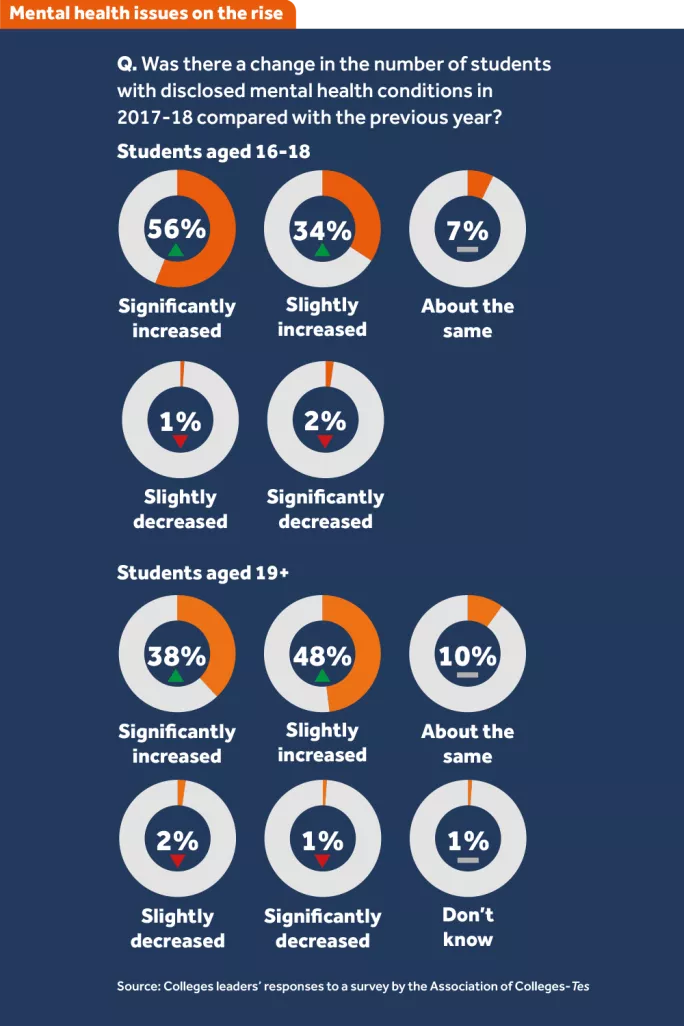‘Many students can’t access the support they desperately need’

The scale of mental health issues affecting the UK population is stark. Data from the Mental Health Foundation, published last month, shows that two-thirds of young adults who took part in its survey admitted to feeling so stressed at least once during the previous year that they had felt overwhelmed or unable to cope. And the impact of this trend is being felt within colleges.
When Richard Caulfield joined the Association of Colleges as regional director for the North West, he asked principals he met about which issue was keeping them awake at night. “On consecutive visits they said not funding, not Ofsted, but mental health,” he says.
And the challenges for colleges posed by students’ mental health issues are becoming even more pronounced, reveals the annual AoC survey of college leaders, in partnership with Tes. More than half (56 per cent) of college leaders cite a “significant increase” in the number of 16- to 18-year-olds with a disclosed mental health condition during the past year.

The picture is similar for adult learners: 86 per cent of college leaders say they have noticed an increase in the number of cases among older students.
And, perhaps more challengingly, nearly two-thirds of colleges say they are encountering significant numbers of other students with mental health difficulties who have not formally disclosed them.
Difficulty accessing services
The issue is close to the heart of Emily Chapman, vice-president for further education at the NUS students’ union, who says she has suffered from “heavy depression and anxiety”. She believes the AoC-Tes survey figures are a major cause for concern.
“I have seen this day-to-day in the past, and suffered from it myself for many a year,” says Chapman. “Unfortunately, while more students are disclosing [mental health issues to their colleges], massive cuts to funding mean that many cannot access the support they desperately need.”
The survey, completed by leaders of 90 colleges - a third of the total in England - found that many institutions have increased their capacity to deal with the mental health of the student body.
Some 63 per cent of colleges have a dedicated staff member to support students with mental health issues. And this comes despite falling budgets: two-thirds of respondents say that outside resources for support have either declined or plateaued, while one-in-10 colleges say that outside resources have “significantly declined”.
Institutions are often supplementing those resources from other funding streams; none of the respondents reported a drop in spending on support.

Reaseheath College in Cheshire has seen a 25 per cent increase in the number of students seeking help in the past year. Senior wellbeing coordinator Nicola McCleave says that, given the support offered by her team of eight trained counsellors, GPs now often refer students back to the college to avoid having to wait up to 18 months to access NHS mental health services. “That is great for us - it means we’re doing a really good job,” says McCleave.
Tom Madders, director of campaigns at mental health charity YoungMinds, believes there is a “mental health crisis in our classrooms”. The charity is calling for extra resources for colleges to manage the situation, as well as a greater emphasis on student wellbeing in Ofsted inspections. “We are calling for a fundamental rebalancing of the education system so that colleges no longer feel they are being asked to prioritise exam results over the wellbeing of their students,” he adds.
Improving cooperation with other services is also key, according to Chapman. “A joined-up approach with NHS services and colleges is required to better support every FE student who faces difficulties,” she says. “Students need mental health services to be adequately funded, and want their colleges to run campaigns about the symptoms and different forms of poor mental health, to help reduce the stigma that currently surrounds the issue in the sector.”
Currently, colleges’ links with health authorities vary significantly. Some 42 per cent of college leaders say their relationship with the director of public health - who is responsible for the overall vision and objectives for public health in the local area, including mental health - is non-existent. However, 68 per cent say that their relationship with their child and adolescent mental health services (Camhs) provider is good or very good, compared with 46 per cent who say that their relationship with their adult mental health service provider is at that level.
The AoC has set up a mental health and wellbeing policy group, bringing together colleges, Public Health England, the Department for Education and NHS England. Next week, the AoC will also publish a collection of case studies to highlight good practice in this area. Among the colleges highlighted is New City College, Hackney, which has a partnership with the local NHS mental health trust to overcome barriers to education for local people with severe mental health issues; it also offers practical support with application forms and enrolment.
The former principal of the college, Ian Ashman, made the improvement of support for students with mental health issues a priority during his term as AoC president. He says the findings are a “sad reflection on the challenges facing further education students”.
Ashman adds that he hopes the survey findings will “persuade more clinical commissioning groups and directors of public health to put more resources into FE and better engage with their local college, to enhance the support given to students in the future”.
You need a Tes subscription to read this article
Subscribe now to read this article and get other subscriber-only content:
- Unlimited access to all Tes magazine content
- Exclusive subscriber-only stories
- Award-winning email newsletters
Already a subscriber? Log in
You need a subscription to read this article
Subscribe now to read this article and get other subscriber-only content, including:
- Unlimited access to all Tes magazine content
- Exclusive subscriber-only stories
- Award-winning email newsletters